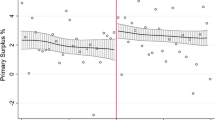Abstract
This paper presents new evidence on the hypothesis that coalition governments will find it more difficult to keep their budgets in line after an adverse economic shock than do one-party, majoritarian governments. The estimates are based on a broad sample of OECD countries, for the period 1979–1995. Using various specifications as suggested in the literature, we do not find evidence that the type of government affects cross country variation in fiscal policy. However, the number of political parties in government affects central government debt growth.
Similar content being viewed by others
References
Alesina, A. and Drazen, A. (1991). Why are stabilizations delayed?: A political economy model. American Economic Review 81: 1170–1188.
Alesina, A. and Perotti, R. (1995). Fiscal expansions and adjustments in OECD countries. Economic Policy, Nr. 21: 207–248.
Borrelli, S.A. and Royed, T.J. (1995). Government strength and budget deficits in advanced democracies. European Journal of Political Research 28: 225–260.
Barro, R.J. (1979). On the determination of public debt. Journal of Political Economy 87: 940–971.
Corsetti, G. and Roubini, N. (1991). Tax smoothing discretion versus balanced budget rules in the presence of politically motivated fiscal deficits: The design of optimal rules for Europe after 1992. Unpublished manuscript.
Edin, P. and Ohlsson, H. (1991). Political determinants of budget deficits: Coalition effects versus minority effects. European Economic Review 35: 1597–1603.
Grilli, V., Masciandaro, D. and Tabellini, G. (1991). Political and monetary institutions and public financial policies in the industrial countries. Economic Policy, Nr. 13: 341–392.
Haan, J. de and Sturm, J.E. (1994). Political and institutional determinants of fiscal policy in the European Community. Public Choice 80: 157–172.
Haan, J. de and Sturm, J.E. (1997). Political and economic determinants of OECD budget deficits and government expenditures: A reinvestigation. European Journal of Political Economy 13: 739–750.
Hahm, S.D. (1996). The political economy of deficit spending: A cross comparison of industrialized democracies, 1955–90. Environment and Planning C: Government and Policy 14: 227–250.
Hahm, S.D., Kamlet, M.S. and Mowery, D.C. (1996). The political economy of deficit spending in nine industrialized parliamentary democracies. Comparative Political Studies 29: 52–77.
Hallerberg, M. and Hagen, J. von (1997). Electoral institutions, cabinet negotiations, and budget deficits within the European Union. CEPR Discussion paper No. 1555.
Kontopoulos, Y. and Perotti, R. (1997). Fragmented fiscal policy. Unpublished manuscript.
Lijphart, A. (1984). Democracies: Patterns of majoritarian and consensus government in twenty-one countries. New Haven: Yale University Press.
Missale, A. (1994). Public debt management. Unpublished doctoral dissertation. MIT, Cambridge.
Roubini, N. and Sachs, J. (1989a). Political and economic determinants of budget deficits in the industrial democracies. European Economic Review 33: 903–938.
Roubini, N. and Sachs, J. (1989b). Government spending and budget deficits in the industrial countries. Economic Policy 8: 99–132.
Schick, A. (1993). Governments versus budget deficits. In K. Weaver and B. Rockman (Eds.), Do institutions matter? Government capabilities in the US and abroad. Washington, DC: The Brookings Institution.
Spolaore, E. (1993). Policy making system and economic efficiency: Coalition governments versus majority governments. Unpublished manuscript.
Strom, K. (1990). Minority governments and majority rule. Cambridge: Cambridge University Press.
Woldendorp, J., Keman, H. and Budge, I. (1993). Handbook of Democratic Government. Dordrecht: Kluwer Academic Publishers.
Author information
Authors and Affiliations
Rights and permissions
About this article
Cite this article
de Haan, J., Sturm, JE. & Beekhuis, G. The Weak Government Thesis: Some New Evidence. Public Choice 101, 163–176 (1999). https://doi.org/10.1023/A:1018326917813
Issue Date:
DOI: https://doi.org/10.1023/A:1018326917813




